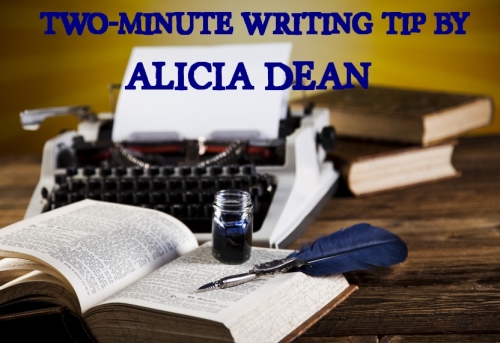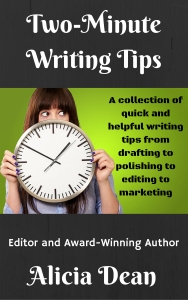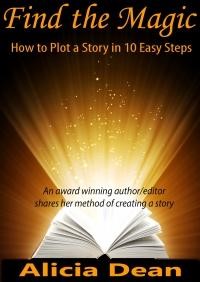Got two minutes? Then check out this week’s quick tip ~ Advice from the Master
Hello and welcome…I am a freelance editor and an editor for The Wild Rose Press, as well as an author. I often struggle with my own writing, and I have found that sometimes, a little reminder of ways to improve the process can be helpful, so, I like to share these moments of brilliance with others :). But, in this busy world of ours, who has time for pages and pages of writing tips? That’s why I’ve condensed mine down to quick flashes you can read in (approximately) two minutes. Enjoy…
Disclaimer: All of my tips are suggestions, and are only my opinion. And, for the most part, there are exceptions when going against my advice will make your story read better. Take what works, leave the rest.
Whether or not you have read, or enjoy, Stephen King’s writing, you can no doubt benefit from his wisdom. While I did not love every one of his books, I can easily say, I’ve loved MOST of them, and of all the authors I’ve read, regardless of how well they write, none is the ‘storyteller’ that Stephen King is. Actually, the word ‘teller’ is misleading (and can be a bit frightening as a writer, when we’ve had it hammered into us to ‘show’ not ‘tell’ – but trust me, this is a different kind of ‘telling’), because when you’re a brilliant storyteller, the reader is swept along on a journey, immersed in the story to the point that they forget they are reading. And that is the highest form of ‘showing.’
Some of my favorite tips from Stephen King:
Don’t use passive voice. “Timid writers like passive verbs for the same reason that timid lovers like passive partners. The passive voice is safe. The timid fellow writes “The meeting will be held at seven o’clock” because that somehow says to him, ‘Put it this way and people will believe you really know. ‘Purge this quisling thought! Don’t be a muggle! Throw back your shoulders, stick out your chin, and put that meeting in charge! Write ‘The meeting’s at seven.’ There, by God! Don’t you feel better?”
Avoid adverbs. “The adverb is not your friend. Consider the sentence “He closed the door firmly.” It’s by no means a terrible sentence, but ask yourself if ‘firmly’ really has to be there. What about context? What about all the enlightening (not to say emotionally moving) prose which came before ‘He closed the door firmly’? Shouldn’t this tell us how he closed the door? And if the foregoing prose does tell us, then isn’t ‘firmly’ an extra word? Isn’t it redundant?” Avoid adverbs, especially after “he said” and “she said.” “While to write adverbs is human, to write ‘he said’ or ‘she said’ is divine.”
But don’t obsess over perfect grammar. “Language does not always have to wear a tie and lace-up shoes. The object of fiction isn’t grammatical correctness but to make the reader welcome and then tell a story… to make him/her forget, whenever possible, that he/she is reading a story at all. “
Leave out the boring parts and kill your darlings. “Mostly when I think of pacing, I go back to Elmore Leonard, who explained it so perfectly by saying he just left out the boring parts. This suggests cutting to speed the pace, and that’s what most of us end up having to do (kill your darlings, kill your darlings, even when it breaks your ecgocentric little scribbler’s heart, kill your darlings.)”
Write primarily for yourself. Write what you love. Love what you write. King says, “I did it for the pure joy of the thing. And if you can do it for joy, you can do it forever.”
Tell stories about what people actually do. “Bad writing is more than a matter of shit syntax and faulty observation; bad writing usually arises from a stubborn refusal to tell stories about what people actually do — to face the fact, let us say, that murderers sometimes help old ladies cross the street. The people in your stories are what readers care about the most, so make sure you acknowledge all the dimensions your characters may have.”
Write every single day. “Once I start work on a project, I don’t stop, and I don’t slow down unless I absolutely have to. If I don’t write every day, the characters begin to stale off in my mind … I begin to lose my hold on the story’s plot and pace.”
If you do not write consistently and visit your story, your characters, day after day, you will lose your enthusiasm, your connection. As King describes it, this is “the smooch of death.” No matter how little time you have, write SOMETHING on your story daily, even if it’s just a paragraph, or as King says, “one word at a time.” This is something I need to practice myself, and believe me when I say, I do not. With a full-time non-writing job, editing for The Wild Rose Press, freelance editing, promo, side projects, spending time with family, etc, I have little spare time, and I do not devote enough to my writing, but I vow to change that immediately. 🙂 (Many of the tips I share on my blog are meant for me as much, or more than, for anyone else. I certainly need to ‘practice what I preach.’)
What do you think of these tips? Which is your favorite? Are there any that you need to apply?
(If you haven’t read ‘On Writing’ I highly recommend it. Not only does it offer a great deal of writing advice, it also offers a look into the fascinating life of King. You can find it here: ON WRITING)
Until next time…happy writing!
~*~*~*~*~*~*~*~*~*~*~*~*~*~*~*~*~*~*~*~*
NEW RELEASE – Now Available – Only a few more days at 99¢! (I know I keep saying this, but I really mean it this time…the sale price ends this Friday, April 29th) 🙂
(Click on the cover to be taken to the Amazon Buy Page)
I have released an e-book with a collection of Two-Minute Tips I have shared on my blog. Now, you can have them in one convenient place for easy reference. sale price is 99¢ – Regular price will be $2.99.
~*~*~*~*~*~*~*~*~*~*~*~*~*~*~*~*~*~*~*~*
*** If you would like to send me a few sample pages (around 7500 words or so, even though I will not edit that many on the blog. It just gives me more to choose from) for me to edit and share on an upcoming blog post, please do so in the body of an email to AliciaMDean@aol.com. Please use the subject line: “Blog Submission” This is for published or unpublished authors. In the email, please include whether you would like me to use your name or keep it anonymous, and whether or not you would like me to include any contact info or buy info for your books. Also, you can let me know if you would like for me to run my edits by you before posting on the blog. Please keep in mind, this is for samples to use for blog posts. I will not edit or use samples from all the submissions I receive, but I will use as many as possible.
~*~*~*~*~*~*~*~*~*~*~*~*~*~*~*~*~*~*~*~*
*** Find the Magic is FREE through Tomorrow, April 6th!! Click HERE
How to write a novel? That is the question. There are probably as many answers to that question as there are people who ask it.
Wanting to write and actually doing it are two very different things. I am well acquainted with the sometimes grueling process of churning out a story. Over the years, I have tried many methods for creating and completing manuscripts, and have tweaked and honed it down to a workable (for me) process.
Using specific examples from one of my own novels, Without Mercy, I share my method in this mini how to book. The first eight steps actually deal with plotting while the last two are designed to help expand your outline into a well-developed draft. There is no one, perfect way to create a story, but there will be a method, or methods that work for you. I’m not sure if this is the one, but it works for me. Only you can decide if it also works for you. Fingers crossed that it does!
*** Warning – Please do not purchase without reading a sample. (This is solid advice for any book, fiction or non. If you are not intrigued in the sample, you will likely not enjoy the book)
Amazon: Click Here




